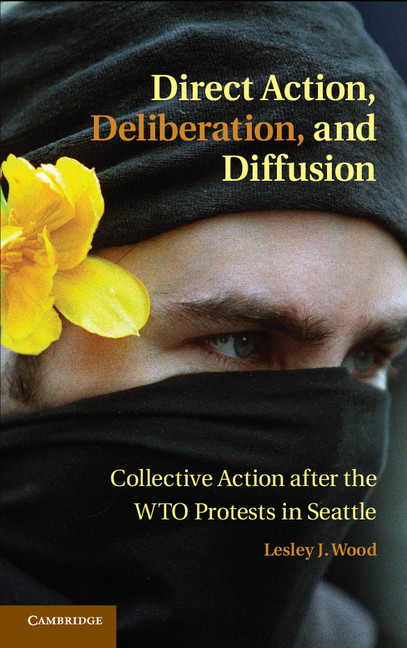Direct Action, Deliberation, and Diffusion

Direct Action, Deliberation, and Diffusion
Collective Action after the WTO Protests in Seattle
- Lesley J. Wood, York
Cambridge University Press
Series: Cambridge Studies in Contentious Politics
2014
200 p.
19,99 £
What are the micro-level interactions and conversations that underlie successful and failed diffusion? By comparing the spread of direct action tactics from the 1999 Global Justice Movement protests against the World Trade Organization in Seattle to grassroots activists in Toronto and New York, Lesley Wood argues that dynamics of deliberation among local activists both aided and blocked diffusion. To analyze the localization of this cycle of protest, the research brings together rich ethnography, interviews, social network analysis and catalogs of protest events. The findings suggest that when diverse activists with different perspectives can discuss innovations in a reflexive, egalitarian manner, they are more likely to make strategic and meaningful choices.Reviews
Sean Chabot, Eastern Washington University: "Lesley Wood offers original insights into why Battle of Seattle tactics diffused more successfully to New York than to Toronto. In accessible language and intimate detail, she shows that the quality of conversations was the main reason for this difference in pathways. While Wood acknowledges structural and relational contexts, she pays special attention to deliberation, experimentation, and direct action. As insider in both movement communities, her perspective of transnational diffusion is unique. With the wave of resistance continuing to spread from Tahrir Square to Occupy Wall Street and beyond, this book is a 'must read' for scholars and activists alike."
Eric Selbin, Southwestern University: "Wood's deeply rich substantive exploration of why direct action tactics work here not there and now not then, is theoretically sophisticated and eminently accessible and brings activist social science into the mainstream. Smart, challenging, reflective, and marked by commitment to real people in the real world making real decisions about things that really matter, this engaging story and astute analysis of what works (and does not) when, where, why, and how will be welcomed by scholars, students, and activists. This superbly crafted volume is another achievement for one of the most innovative and exciting series in the social sciences."
Marina Sitrin, CUNY Graduate Center, Committee on Globalization and Social Change : "Direct Action, Deliberation, and Diffusion is a must-read for social movement theorists and activists alike. Wood's detailed case study helps us understand how movement tactics and strategies are shared, or not, using the theoretical framework of diffusion. This text is particularly useful today, with the growing uprisings and movements that began in 2011 spreading across the globe."
Table of Contents
1. Introduction
2. The Seattle cycle: 1998–2002
3. The Seattle tactics
4. The organizations most likely to adopt
5. Regimes on repertoires: nation-states, cities, and networks
6. Opinion leaders: local anti-globalization coalitions
7. Talking 'bout a revolution
8. Talking about smashing
9. Not like us: debates about identity
10. The cops and the courts: the effect of repression
11. After 9/11: the effect of repression
12. Conclusion.